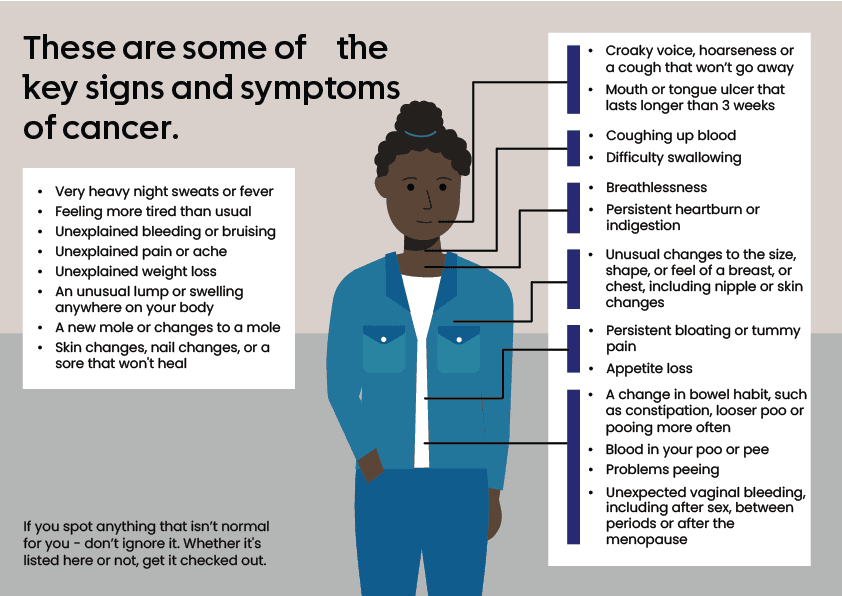About Cancer
Spotting cancer at an early stage means treatment is more likely to be successful. Being aware of some of the key signs and symptoms of cancer can help.
You don’t need to remember all the signs and symptoms of cancer. But it’s important to listen to your body and talk to your doctor if you notice anything that isn’t normal for you.
Most of the time, these signs and symptoms won’t be caused by cancer. But if it is, spotting it early can make a real difference.
This page covers some of the key signs and symptoms of cancer, which could help you spot cancer early. If you are looking for information on symptoms of a specific cancer type, go to our .
Visit our publications site for easy read information on spotting cancer early.
There are over 200 different types of cancer, and they all have different signs and symptoms. Some affect specific areas of the body, such as our tummy or skin. But symptoms can also be more general, such as weight loss, tiredness (fatigue) or unexplained pain.
Some symptoms, like a lump, are better known than others. But this doesn’t mean they’re more important or more likely to be cancer. You should get any possible symptom of cancer checked out.
But as there are so many signs and symptoms of cancer, it would be impossible to remember them all. That’s why it’s important to be aware of what is normal for you and speak to your doctor if you notice any unusual changes or something that won’t go away. This can help to diagnose cancer at an early stage, when treatment is more likely to be successful.
We have listed some of the key signs and symptoms of cancer below. Talk to your doctor if you notice one of these, or any other unusual changes even if they aren’t on this list.
Most of the time these symptoms will be caused by something less serious than cancer. But it’s still important to get checked out.

Some symptoms are general, and could affect any part of the body, or the whole body.
Sweating at night or having a high temperature (fever) can be caused by infections or a side effect of certain medications. It’s also often experienced by women around the time of the menopause. But speak to your doctor if you have very heavy, drenching night sweats, or an unexplained fever.
If you have unexplained bleeding or bruising when you have not hurt yourself, it important to get checked out by your doctor. This could be from anywhere in your body, and includes vomiting or coughing up blood. No matter how much blood or what colour it is (blood can be red, or a darker colour like brown or black), speak to your doctor.
There are lots of reasons why you may feel more tired than usual, particularly if you’re having trouble sleeping or are stressed. But if you’re feeling tired all the time, or if there is no clear reason you’re feeling tired, speak to your doctor.
Pain is one way our body tells us that something is wrong. As we get older, it’s more common to experience aches and pains. But unexplained or persistent pain anywhere in the body could be a sign of something more serious. Speak to your doctor about it, especially if the pain is getting worse, or changes in any way.
Small weight changes over time are quite normal. But if you or other people think you have lost a noticeable amount of weight when you aren’t trying to, tell your doctor.
Persistent lumps or swelling in any part of your body should be taken seriously. This includes any lumps in the neck, armpit, stomach, groin, chest, breast, or testicle. Speak to your doctor if you notice these.
Some cancer types may cause symptoms that affect a certain part of the body, either with or without general symptoms. Here are some key signs to look out for in different body areas:
It isn’t your job to know whether something is serious or not. Cancer can affect different people in different ways, and symptoms won't always be painful or affect your day-to-day life, especially in the early stages. So the best thing you can do is listen to your body. If something doesn’t feel quite right, you’ve noticed an unusual change, or you are worried about cancer, speak to your doctor.
And if you’ve seen the doctor about something already, but your symptoms have continued, keep coming back, or have got worse - make another appointment.
Even if it isn’t cancer, it might be something else your doctor can help with. Or, it might be nothing at all. But your doctor would rather you checked with them again, than miss something important. You’re never wasting their time.
We know talking to your doctor can be difficult, especially when you are worried. Find our key tips for talking to your doctor.
Anyone can develop cancer at any age. But cancer is more common as we get older, and most cases are in people aged 50 or over.
It’s important not to put any unusual changes, aches or pains down to ‘just getting older’ or assume a symptom is because of a health condition you already know about.
Whatever your age, it’s always best to listen to your body and talk to your doctor if something is not normal for you.
Find out more about age and cancer
You can read about:
Last reviewed: 28 Aug 2025
Next review due: 28 Aug 2028

About Cancer generously supported by Dangoor Education since 2010. Learn more about Dangoor Education
What to ask your doctor about clinical trials.
Meet and chat to other cancer people affected by cancer.
Questions about cancer? Call freephone 0808 800 40 40 from 9 to 5 - Monday to Friday. Alternatively, you can email us.